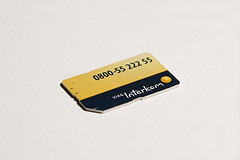
Back in October, we discussed some of the thoughts we were having regarding smartphone use abroad. Now we’re back to talk about how it played out.
We’re Verizon customers, and Verizon Wireless is a CDMA carrier. The majority of the world uses GSM. One of the things about GSM versus CDMA is that GSM uses a SIM card. SIM, or Subscriber Identity Module. The SIM card is tied to the network, as opposed to the phone itself. You can thus move the card in between phones, and thus the number. There is a CDMA equivalent, but it is not currently used in the United States. SIM cards are also used on the LTE network that Verizon used
This was surprisingly easy, but you can’t do it at a store. We tried. You have to call Verizon Global Support(1-800-711-8300), as opposed to regular tech support. They will allow one unlocking per line every ten months, as long as you have been a customer in good standing for at least sixty days. We unlocked multiple global phones, even ones not being brought along, as long as we were on the phone with them. To ensure this works, have a SIM card ready to test before you leave. We used a $5 Telestrial Passport Lite to do this.
AT&T is apparently not as cooperative. You can always buy a fully unlocked phone, but that will be at an increased price.
There are other options to be aware of. If you frequently switch between countries and providers, there is such a thing as a dual SIM adapter, which would allow installation of two SIMs at once. We have yet to try one of these, but it is said you can switch them in software, with an Android phone. There are also card adapters that will, if put inline with a SIM card will allow it to work on a locked phone.
Now that your phone can be used anywhere, you need to start researching options in the country you wish to travel to. If you go there frequently, it makes sense to have a contract. But if this is an infrequent trip, such as a few times a year, or a one-off, you can visit PrePaidGSM.net for some advice. Their forums and pages provide a chance for you to get firsthand advice and experience.
From all the research we did, it seems that the best move is to try and secure a SIM card locally after arrival. There are companies that will provide international cards, or will provide international cards, but they often offer less favorable deals, or at an increased cost. Most international airports nowadays have shops that sell prepaid SIMs and will set it up for you.
If data is more important to you than voice, then you can always turn off the radio in your phone and use wifi only. Although finding wifi hotspots may also be an issue, depending on where you are.
What have you done in the past to maintain your need for cell?
Related articles
- How to SIM Unlock Your Verizon, Sprint or AT&T iPhone 4S (intouchsmartcards.wordpress.com)
- How Can I Use My Smartphone Without a Data Plan? [Ask Lifehacker] (lifehacker.com)
